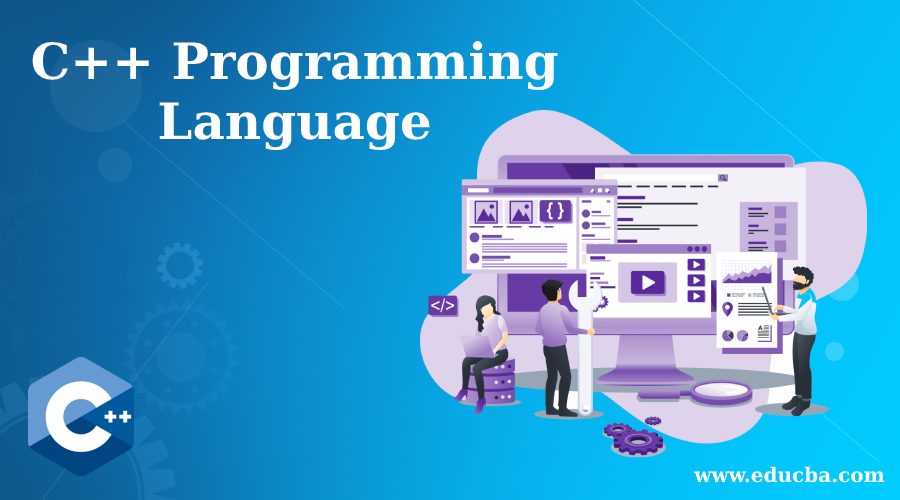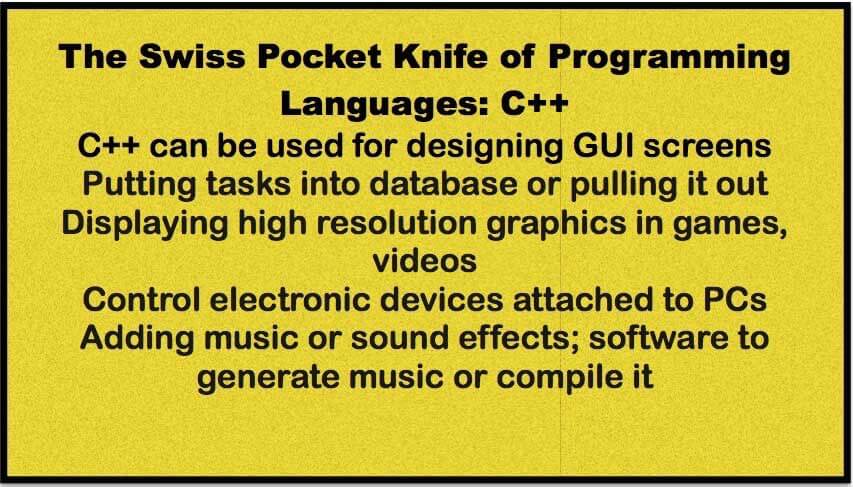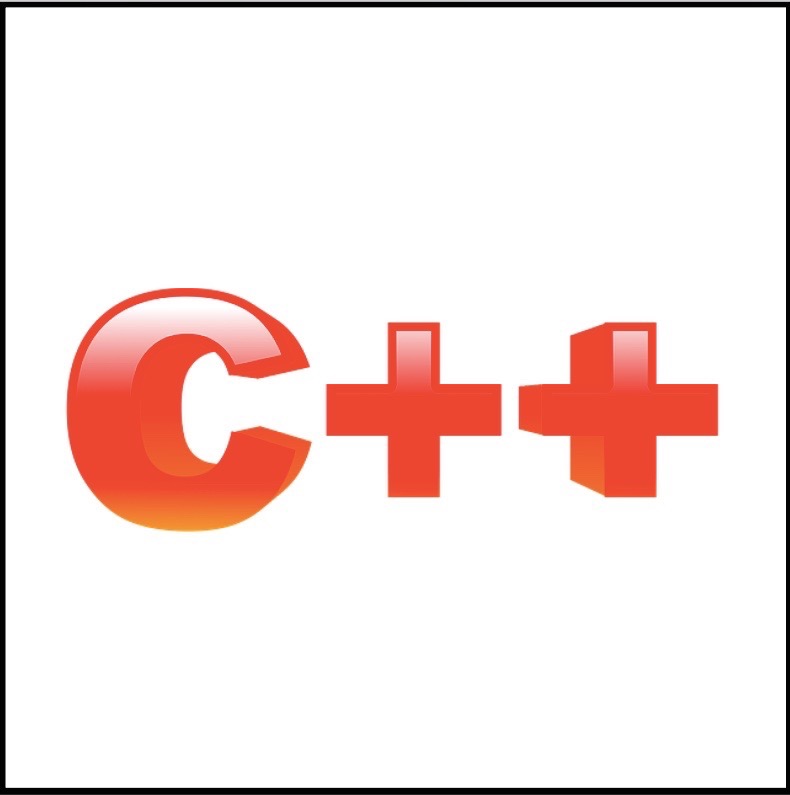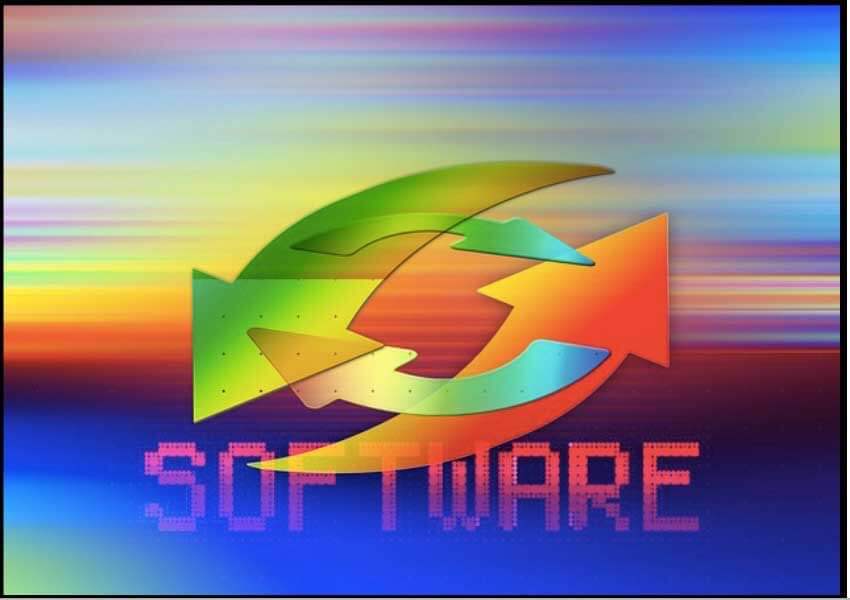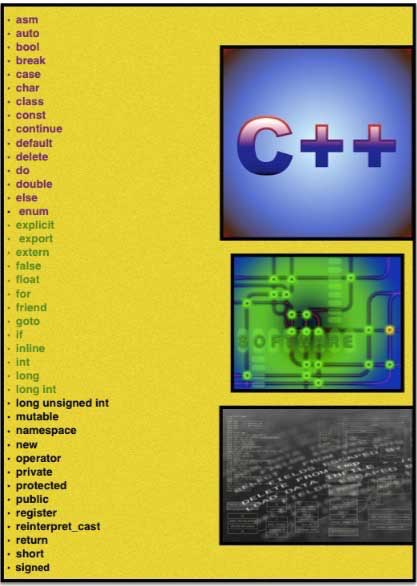Updated June 7, 2023
Introduction to C++ Programming Language Basics
C++ Programming Language offers an infinite sea of possibilities from functional to metaprogramming. Set sail using for new shores in the virtual world using this amazing language. In case you are wondering that C++ does what, here is your ultimate cheat sheet for this unique programming language.
C++ Programming Language: Adding onto C, Matching Java
- C++ is an object-oriented programming language or OOP.
- This language was developed by Bjarne Stroustrup
- It is called C ++ because it is an extension of C language
- C++ is a hybrid language- it can be coded either way
- This is an intermediate level language ( it has both high and low-level language features)
- It was earlier called “C with classes” and was renamed as C++ in 1983.
- C++ was intended to be a blend of Simula and C.
How is C++ Used?
- C++ is used for all kinds of applications from computer games to OS and compilers.
- C++ is a programming language used on every platform and it comes minus a lot of problems associated with Java.
- This language was invented during the early 1980s at Bell Labs
- This programming language adds onto C Programming language and includes modern programming
- C++ is so compatible with C that it can compile more than 99% of the C programs without changing even a single source code
- Anything that computers can physically perform from manipulating numbers to text can be programmed using C++
Image source: pixabay.com
C++: No Limits to Programming
With C++, you can do so much more. So, what was C++ intended for? Well, Java was devised for controlling toasters, C for programming OS, Pascal to impart good programming methods, yet C++ is the Jack of All Trades and can be used across widespread applications.
This is why most computers have C++. It is a universal programming language that can be found in every type of microcomputer. There are C++ compilers for every kind of OS. Commercial, as well as free ones, are available including Borland’s Turbo C++ Explorer, Watcom C++ compiler and many more. These compilers will help you in editing, compiling and debugging apps.
Has Open Source Software Been Written in C++?
A lot of open-source software has been written in C++. Open source code can easily be acquired, unlike source code for commercial applications. C++ is among the most popular programming languages in the world.
Image source: pixabay.com
Decoding C++
- C++ uses system/application softwares, drivers, client-server applications plus embedded firmware.
- C++ is a collection of classes which are pre-defined and these data types can be instantiated numerous times. This language enhances the deceleration of the user-defined classes for accommodating member functions for carrying out specific functionalities.
- Numerous objects of a certain class can be defined for implementing functions within it
- Objects are instances created at run time. What makes C++ special is that classes can also be taken on by new classes which acquire public as well as protected functionalities. This programming language includes several operators such as comparison arithmetic, bit manipulation and logical operators. Compilers were created in high-level programs which made it easier to understand different programming languages- they are also called interpreters or assemblers and are built into various programming applications. C++ is a compiled language.
- C++ programs can be compiled through the use of Integrated Development Environment which integrates development tools such as text editors and tools for direct compilation.
C++: Seeing the Benefits
C++ has obvious advantages. This middle-level language has the following features:
- Statically typed and compiled
- General Purpose
- Case Sensitive
- Freeform Programming Language
Supports procedural, object-oriented and generic programming
C++ is a superset of C that fully supports the encapsulation, data hiding, inheritance, and polymorphism.
Building Blocks of C++
C++ consists of three parts: core language, C++ Standard Library and Standard Template Library. Core language includes variables, data types and literals. C++ Standard Library includes functions manipulating strings, files and more. STL or Standard Template Library provides a plethora of data structure manipulation methods.
ANSI: The Golden Standard
The ANSI Standard ensures that C++ is portable and the code used for Microsoft compiler will work without errors on Mac, UNIX, Alpha or Windows Box. Major C++ compilers support the ANSI standard.
C++: Many Programming Styles, Different Avatars
This unique programming language supports numerous styles including Fortran, C, Smalltalk and more. Each style has its own runtime and space efficiency.
C++ is used in virtually every application domain and it has also been used to write device drivers and software that are based on direct manipulation of hardware within constraints in real-time. This programming language is used for teaching as well as research.
Whether you use an Apple Mac or a Windows PC, C++ is the base of the user interface. Most frequently used and available compiler is the GNU C++ else compilers from HP or Solaris can also be opted for.
Learn to design and customize programs for various platforms. Code, test, debug, and implement software applications. Develop skills to ensure applications run smoothly.
C++ : The Basics
Comments in C++ can be single or multi-line and start with /* and close with */. Comments can also start with //, extending to the lines end.
Built-in, as well as user-defined data types in C++, are listed below:
| Type | Keyword |
| Boolean | bool |
| Character | char |
| Integer | int |
| Floating Point | float |
| Double Floating Point | double |
| Valueless | void |
| Wide character | wchar_t |
Variables in C++
Scope refers to region of the program. There are three ways in which variables in C++ can be declared namely within the function or block (local variables), definition of function parameters (formal parameters) and outside of functions (called global variables).
Constants/Literals in C++
These are fixed values that cannot be altered in the program. They are also called literals. Their values cannot be modified following definition.
Image source: pixabay.com
Modifier Types in C++
Char, int and double data types in C++ have modifiers preceding them. Modifiers alter the precise meaning of the base type to fit situations.
Data type modifiers include:
- Signed
- Unsigned
- Long
- Short
C++ Storage Classes
A storage class defines the lifetime and scope of variables and/or functions within C++. Specifiers precede types being modified. Storage classes in C++ programs include the following:
- Auto
- Static
- Register
- Extern
- Mutable
Operators in C++
A operator is a symbol which enables the compiler to perform mathematical or logical functions. C++ has the following types of operators:
- Relational operators
- Arithmetic operators
- Logical operators
- Assignment operators
- Bitwise operators
- Miscellaneous operators
Loop Types in C++
For handling looping requirements, the following options are available in C++:
- While
- For
- Do….While
- Nested
Decision Making in C++
This is based on any one of the following types of statements:
- If statement
- If….else statement
- Switch statement
- Nested if statements
- Nested switch statements
C++ Functions
This comprises a function header and body. Functions contain the following parts:
- Return type
- Function name
- Parameters
- Function body
C++ Classes and Objects: Class definition commences with keyword class and class name as well as class body. Class definition should be followed by semicolon or list of declarations. Class provides the blueprint for objects. Object is born from class. Public data members of objects of class can be accessed through direct member access operators.
Inheritance and Overloading: How C++ Adds On
A most important concept in object oriented programming is inheritance which lets a derived or new class inherit the members of the existing or base class. Class can be derived from more than one classes and can inherit data and functions from numerous base classes. Overloading allows users to specify more than one definition for function name or operator known as function and operator overloading respectively.
Image source: pixabay.com
Polymorphism within C++
C++ polymorphism indicates a call to a member function will lead to the execution of a different function depending on the nature of the object that invokes the function.
C++ Abstracts and Encapsulates
Data abstraction is provision of essential information to the outside world and withholding background details to represent needed data only. This is a programming technology that is based on separation of interface and implementation.
C++ programs are composed of the following elements:
- Code or program statements
- Program data
Encapsulation is an object oriented programming technique that binds data and functions manipulating the data. This leads to the concept of data hiding. Encapsulation and data hiding is created through user defined classes which can contain private, public and protected members.
Image source: pixabay.com
This general purpose programming language aims for a better C, with data abstraction, generic and object oriented programming.
Standardization of C++: Later trends
Initially formal standardization of C++ was started in the 1990s under the American National Standards Institute and the International Standards Organization ISO leading to international standard in 1998. (C++, 1998). C++ was designed to ensure high level programming techniques from Simula could be used in the systems programming domain by promoting higher degree of flexibility and efficiency.
C++ is aimed at serious programmers and driven by real problems. It is focused on being useful in the here and now, providing support for programming styles and features which can be well implemented.
C++ was designed to ensure every language feature is usable in code under constraints of time and space, relying on direct manipulation of hardware. C++ codes support maintainability and ease of extension as well as testing.
Areas where C++ is used professionally include:
- Banking
- Trading
- Insurance
- Telecommunications
- Military applications
C++ can be used in local and wide area networking, graphics, numerics, user interaction and database access and it can also coexist with code fragments and programs composed in other programming languages. C++ can be used for diverse development plus execution environmental and teaching advanced concepts. C++ is also supported with a stable and well specified standard library.
Reserved Words in C++
There are many reserved words in C++ as well, which are listed ahead. Operators can be overloaded and redefined too.
C++ and C: The Similarities
C++ and C are case sensitive. C/C++ is also free form; this means there is no special meaning to a line. Both C and C++ provide several integer data types giving the programmer close control over how memory is used. Some of the other points of similarity are as follows. The execution flow for both programming languages is from the top to bottom and both allow procedural programming. C and C++ do not allow reflection. Within these two programming languages, code is compiled in native executable binary files. Inline comments delimiter is // for both languages and block comments delimiter is /* and */. Statements terminate in “;” in C++ and C both. Both programming languages also provide support for multidimensional arrays. Arrays are not dynamically sized in C as well as C++ and platforms for both must have compilers. C as well as C++ provide ways to deal with several memory areas that contain several values.
C++ and C: The Differences
Several variables can be declared. Some of them are allocated within the static area of the memory i.e those where variable declarations are written outside the function.
For declaring variable x of type T, you need to write:
T x;
In C, a variable can only de declared outside the function or the function or block’s start. Variables can also be declared inside blocks.
In C, typing discipline is static/weak while it is static/strong, unsafe and nominative in C++. C follows imperative/procedural systems implementation language. C++ on the other hand, is multi-paradigm, generic, procedural, functional, object-oriented and meta.
C has influenced C++, C#, BitC, Objective-C, Concurrent C, JavaScript, Java, PHP, Peral and Limbo.
C++ has influenced Java, PHP, and C# too, but that is where the similarity ends. C++ has influenced D, Aikido and Ada 95.
C is influenced by ALGOL 68 as is C++. But B/BPCL, CPL, and Assembly are associated with C while other influences on C++ include Simula, C itself, Ada 83, CLU and ML
Major implementations for C include CGG, Watcom C, Borland C, and MSVC. For C++, the implementations are through Borland C++, Builder, LLVM/Clang, Microsoft Visual C++, GNU Compiler Collection and Intel C++ Compiler. While C appeared earlier (1972), C++ appeared in 1985. Manual; allows better management of memory. C apps are faster for compiling and execution than C++, with an added advantage of 5%. But the performance of both languages is near equivalent because of mature compilers.
Usual filename extensions in C++: .cc,.cxx, .h, .hh, .hpp., .cpp.
In C, the usual filename extension is .c.
While OOP is built into C++, it is not so in the case of C where there is freedom to set up structures for performing the same actions as objects. The downside is that C does not have the ability to declare encapsulation. While C uses structures thereby giving more options to use internal design elements, C++ uses class and struct. While C is a Procedural Oriented Language, C++ is a multiple paradigm object-oriented language. C does not make provision for generic programming while C++ does. On the other hand, C allows functional programming while C++ only partially allows it. However, C++ allows metaprogramming while C does not.
Conclusion
Image source: pixabay.com
Opening up a vast expanse of an infinite sea of possibilities, C++ is a precise language with unlimited applications. Using C++ in a wide range of applications, programmers have added onto human knowledge and understanding regarding the language of the cyberworld. Whether your area of expertise is learning, research, training or programming, this language offers additional benefits which few others can replicate or outperform. C++ adds onto human capacities in a virtual world to overcome real time constraints and create viable solutions.
Recommended Articles
This has been a guide to C++ Programming Language. Here we have discussed the basic concept, How is C++ Used?, loops used respectively. You may also have a look at the following articles to learn more –

